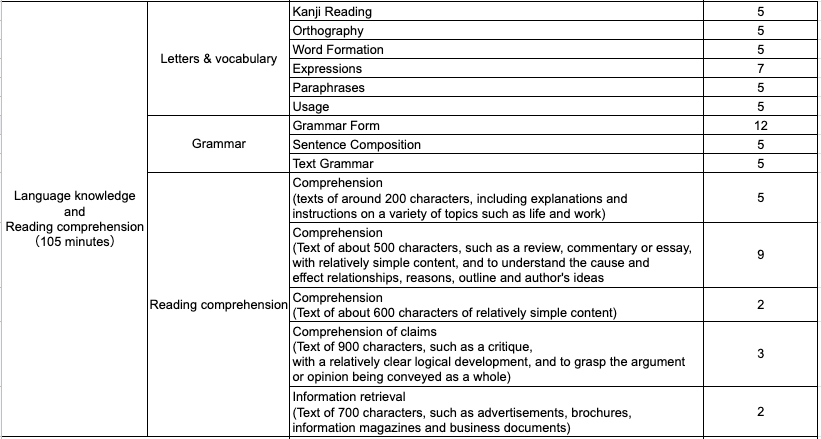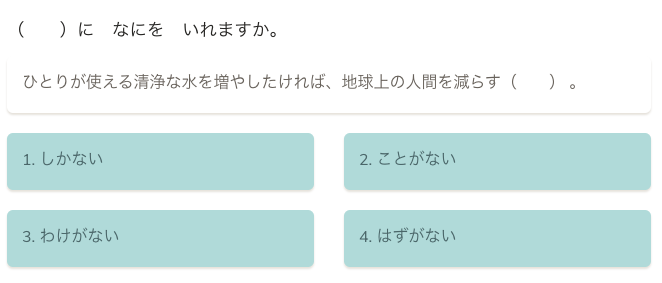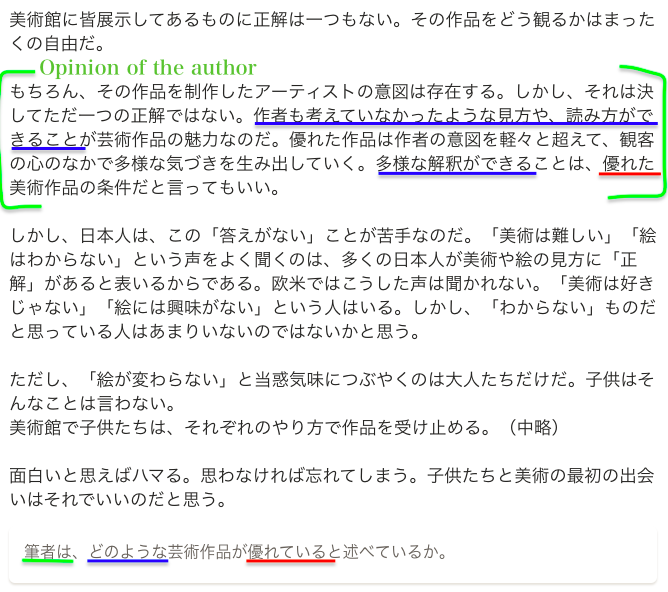Study tips to pass N2?
Even though many people know the result of the JLPT doesn’t correspond with your practical Japanese skills, why will you be required to pass JLPT N2 to find a good white colour job in Japan?
This is because the JLPT tests your knowledge of vocabularies and expressions considered important in a real life, and Japanese companies believe that if you know the words and expressions required in JLPT N2, you will be able to perform well at work.
To tell the truth, without taking N2, it is possibel for you to be qualified for many jobs in Japan. However, we Japanese have a strong tendency to attach great importance to a result of test. That’s why we would like to encourage you to pass efficiently JLPT N2 with a minimum time of study and learn practical Japanese at work.
First of all, Let’s take a look at the details of N2. 👇
JLPT N2 Exam Details
Pass score of JLPT N2
Not only do you have to get 90 points in total, but also you have to get the minimum score in each section.
Total Pass score:90 / 180
①Language knowledge:19 / 60
②Language knowledge and Reading comprehension:19 / 60
③Listening:19 / 60
For N3, N4 and N5, there are fewer vocabulary and grammar items that can be included in the exam, and some questions may provide clues to other questions. That is why the parts ① 【30 minutes】Letters & Vocabulary and ②【70 minutes】Grammar and Reading comprehension are separated.
If you want to know more about the structure of N3, check out this article.👇
However, at N2 and N1 levels, since no other question can be a clue to any other question, they are all in one section although the points will be calculated differently.
Exam Coverage / Objective
The objective of the JLPT N2 is to understand the Japanese used in everyday situations, and in a variety of circumstances to a certain degree. Compared to N3, the part “in a variety of circumstances” is added. What does this phrase exactly connote? It is not specific at all, nor be helpful.
Let’s figure out the meaning, which is very important to decide on which part you have to focus ahead to JLPT N2. When you possess the N2 level, what do the others expect from you? The answer is the ability to deal with a complicated problem with a customer, to paraphrase one sentence to another without losing its main purpose, or to explain a wide range of topics including Politics and Economics.
To sum up, it is the ability to respond flexibly and correctly in a business environment that you must keep in mind when studying for the JLPT N2.
①【105 minutes】Language knowledge and Reading comprehension

③【40 minutes】Listening

Total number of the questions
The total number of questions is “107” and the breakdown is as follows;
【75 questions】Language knowledge and Reading comprehension
【32 questions】Listening
As I mentions above, you have to get the minimum score of each section so that you have the right to be evaluated in JLPT. Even though your score is more than 90 /180 points (50%) in total, you can’t pass if you fail in any one of three sections.
19 / 60 points equate to a score of approximately 32% for each section, and it would require you to answer correctly the following number of questions at least to be able to meet the minimum requirements to pass.
【18 / 54 questions】Letters & Vocabulary & Grammar
【 7 / 21 questions】Reading comprehension
【11 / 32 questions】Listening
So, now let’s take a look at how to study efficiently to pass JLPT N2 in order to achieve 54 correct answers in total.
👇
How to study efficiently for N2?
Think about time allocation
Here are tips! By organizing your time allocation, you can make a quick decision. As you can see below, the questions of JLPT N2 have a big volume and you have to make a quick decision about what questions you have to answer and to abandon immediately.
- 【75 questions in 105 minutes】Language knowledge and Reading comprehension
- 【54 questions】Letter & Vocabulary & Grammar
- 【21 questions】Reading comprehension
Leaving a few minutes to review your answers, this time allocation is ideal.
【Reccomendation】100 minutes to answer all of the questions + 5 minutes to review them.
・54 Grammar questions =42 minutes in total
・5 Reading questions (text of 150〜200 words) =10 minutes in total
・9 Reading questions (text of 350 words) =18 minutes in total
・2 Reading questions (text of 550 words) =10 minutes in total
・3 Reading questions (Comprehension of claims) =10 minutes in total
・2 Reading questions (Information retrieval) =10 minutes in total
Get to know JLPT N2
Obviously, the problem you will face at this level is “lack of time”. Even though you understand every grammar point, if you don’t think of time allocation, it can lead to irreversible mistakes. Let’s take a look at these points in order not to make a big mistake on the day of JLPT.
★【Grammar】Pay attention to “collocation”
I saw many learners trying to memorise Japanese words, but I rarely saw them learning these words as an expression. My point is that it is very important to look at how the words are used in the sentence.
For instance, look at this example. The correct answer is 「1. しかない」. Can you explain why?

Each expression is usually connected to a certain expression, which means if you know the collocation, it helps you a lot to choose the correct answer and also to save time at JLPT! Taking account into account the meaning of the 4 expressions, let’s see the sentence.
- しかない。 :There is no other way but…
- ことがない。:have never been/done…
- わけがない。:It can’t be…
- はずがない。:It can’t be…
「ひとりが使える清浄な水を増やしたければ、地球上の人間を減らす( )。」can be translated as 「If we want to increase the quantity of pure water that each person can use, ( ) decreasing the number of people on the earth」. Now it is easier to choose the correct answer, right?
But, don’t go to the next question! Here is tip to save you time in the future!!
When you face this type of question where you have to choose the answer located at the end of a sentence, please check the connection between phrases. In this case, please look at the part 「ひとりが使える清浄な水を増やしたければ、」. To connect two sentences, 「たければ」is used to mean “If 〜want to…”. Here you can learn that 「しかない。」can be used with 「〜したければ」. 「〜たければ。。。しかない」= 「If you want to 〜, there is no other way but。。。」
⭐️JLPTに受かりたければ、毎日コツコツ勉強するしかない (If you want to pass JLPT, there is no other way but studying hard every day)!!⭐️
★【Reading Comprehension】Parapfrase is a key!
Not can all reading questions be solved this way, but it is very important to pay attention to the expression paraphrased in the text. First of all, please read the question!

What you have to choose is the opinion of the author, so let’s take a look how to find it checking the paraphrased expressions. In JLPT N2, the quoted text contains many obstract expressions to express main author’s opinion. This can complicate the comprehension, but if you know how to find a paraphrase or related word, you don’t worry about it at all.
- 筆者:Don’t be misled by the paragragh where the author give examples.
- どのような芸術作品:「作者も考えていなかったような見方や、読み方ができること」→「多様な解釈ができること」
- 優れている:You can find the same word in the text, so please mark it.
Now, look at the 4 options. The author paraphrases “どのような芸術作品(What kind of arts)” and the question is also related to it. If it isn’t an important opinion, the author won’t rephrase it so many times in a sentence, don’t you think?
To sum up…
Don’t be afraid of difficult texts because the point the author wants to emphasise is always in there. All you have to do is realize where is parafprased!

Conclusion
If you want to pass JLPT N2, we are always with you. Our Japanese learning platform offers you various learning FREE materials (N5〜N1), such as Dashboard to manage your study time, Flashcard for Word, Mini test, Lecture, and Training of Vocabulary&Grammar, Reading and Listening.
© 2021 GLOBAL ASTRA Inc. All Rights Reserved.

We offer the Best Online Japanese Learning (All Free), and our goal is to facilitate the adoption into life in Japan. Our service “IPPO” is made by native Japanese teachers and professionals. The tips we share with you can help you to learn Japanese efficiently and pass JLPT (Japanese Language Proficiency Test).





